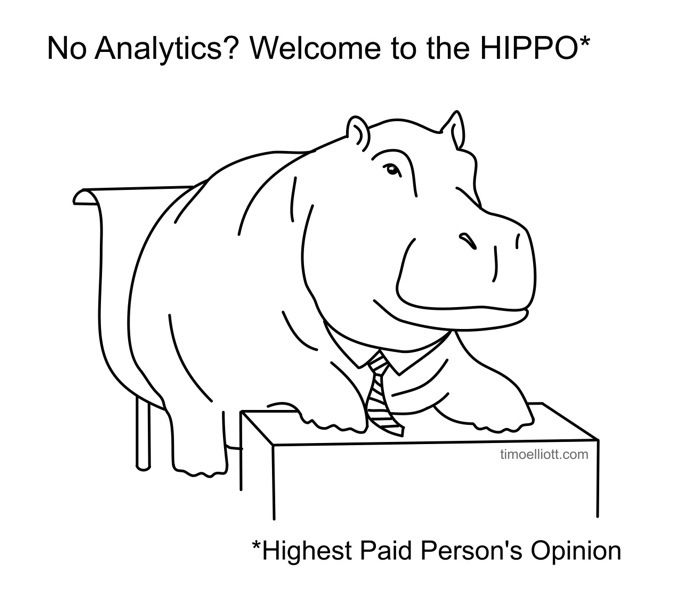“It’s common for people who lack power or status to suppress their dissenting views in favor of conforming to the HIPPO — the Highest Paid Person’s Opinion. Sometimes they have no other choice if they want to survive.”
I got that from an article excerpting Adam Grant’s new book. I used to like Adam G. more — we write about similar stuff, but he’s significantly more famous than I am — but then I tried to email with him a couple of times, and he basically stiff-armed me, so I have less resonance for his stuff now out of spite and bitterness. That’s healthy, right?
I had never actually heard the term “HIPPO” until about 2014, when I think I was 33-34, so I had been working maybe 12-13 years already. At the place I worked in ’14, HIPPO was definitely in play. The CEO was this dude Matthew, who I’ve mentioned in other blogs before but won’t cross-link out of avoiding tedium. Matthew was Management By Shiny Object 101. The last person he spoke with, whatever they said to him, that was suddenly the new “strategy” we all had to follow; then it would change when he spoke to someone from IT, marketing, etc, etc. It was a roller coaster ride of nothingness. I eventually got fired, got divorced about 17 months after that firing, and am still a work in progress from things that commenced (or intensified) in that era.
Any meeting at this place, it was HIPPO to the max. You could come in with data, ideas, research, interviews, discussions, and thought processes — and at the end of the meeting, if action items were anywhere in sight (they often were not), we’d all just be sitting there waiting for the highest-paid person to say “OK, do this” or “OK, let’s call another meeting.” There was very little individual agency at this place. You could work hard, and maybe get noticed, but ultimately you were chasing the opinion and viewpoint of 7-9 people who made more than you and outranked you.
I was blogging more at the time and I started to think about ways to navigate the HIPPO in the room. In reality, it’s not an easy discussion — and there’s not much “thought leadership” out there about it, to be real. The crux of the issue is that if you push back on a HIPPO too much, you become a malcontent. What happens to malcontents? At the first sign of revenue erosion, they are at the top of the layoff list. So if you want to protect your neck, your job, and your income stream, usually you need to roll over for the HIPPO, even if his/her ideas and approaches are awful. As long as the company isn’t tanked and they can still meet payroll, you’re OK, right?
That’s probably the easiest approach.
I think we want to believe in a “data-driven” time that you can come at a HIPPO with data on a problem, and the HIPPO will shift their thinking because of the data. That’s certainly possible, yes, but a lot of HIPPOs essentially virtue-signal about where they got in their career and they think they’re geniuses, so they will often trust their gut over data. Honestly, and very few people admit this in “future of work” posts, but a big part of the “Everyone must bring data” movement of the last 10 years is simply managerial laziness. Managers don’t want to collect data and make compelling arguments; they want to outsource that portion of their job. And then often when they do, they reject all the hard work a person put into data-gathering and analysis by saying “No, I trust my gut on this one.”
I’d say your HIPPO options are usually:
- Try data, if it might work.
- Try relationship-building, if that might get you a few extra points.
- Roll over for the HIPPO.
- Find a new job.
Anything else seems like bullshit.
Agree/disagree?

Let us cut to the bone of the subject. Being “data driven” fails because the purpose of certain businesses isn’t to make money (sorry Econ 101 profs) – its to drive the emotional and financial self-worth of a handful at the top of the org hierarchy.
Bringing data about corporate improvement to someone whose purpose in the role is to boost their own emotional and financial relevance is a dead end. They could care less about optimizing the firm. They care a lot more about looking good to the hierarchy. If the data presented does that (cue slide deck about “leveraging customer experience!!”) , then its accepted. When the data risks making the decision maker look uninformed , it is discarded as invalid.
The foundation of growth is accepting change. That means sometimes you’ll have to admit you made a mistake. If you’re emotionally or psychologically incapable of doing that ( like most executives), growth is impossible. Instead, the company becomes a Game of Thrones style nightmare as managers use company resources to boost their own relevance, the bottom level people are making tactical decisions to keep the trains running, and the executives may as well be orbiting Jupiter. Their acronyms and meetings don’t matter to the customer, their direct reports, or even to the firms revenue.
The customer? “Jeez, why can’t LexCorp get their act together. This is the third billing error in as many months.WTF….”
Agree with everything in this post.
In regards to Grant, he kinda got in trouble not to long ago for not being transparent with his research.
This video explains what happened – https://youtu.be/AZ2aSCH3zjY?t=437